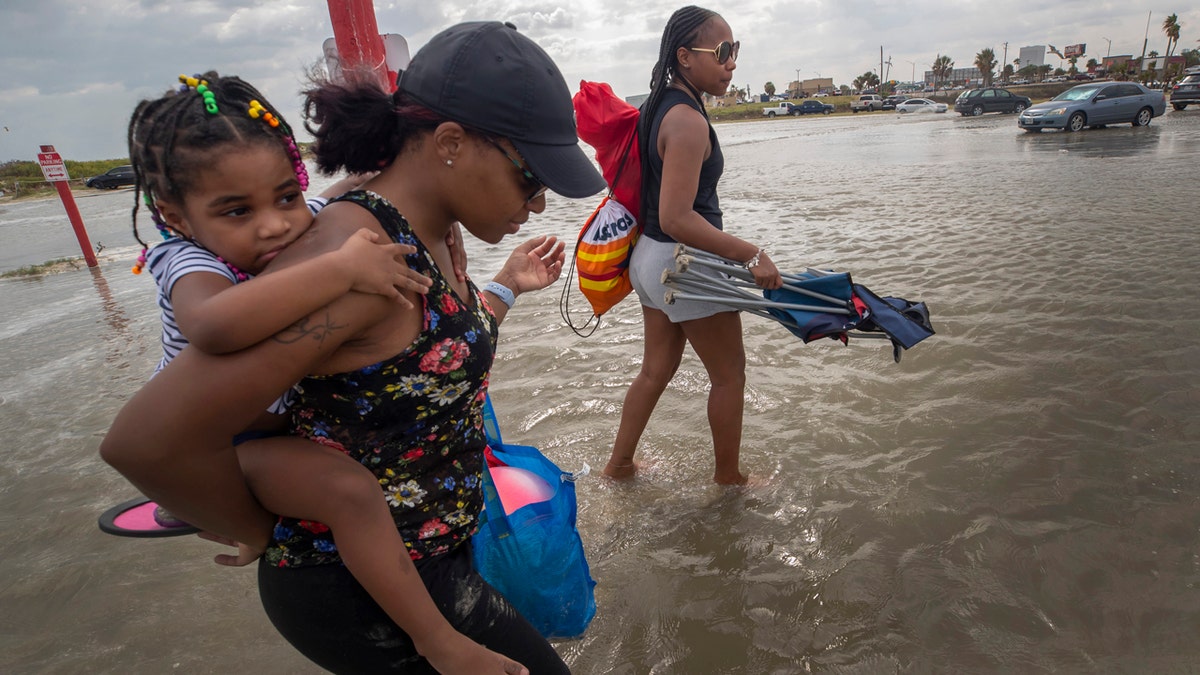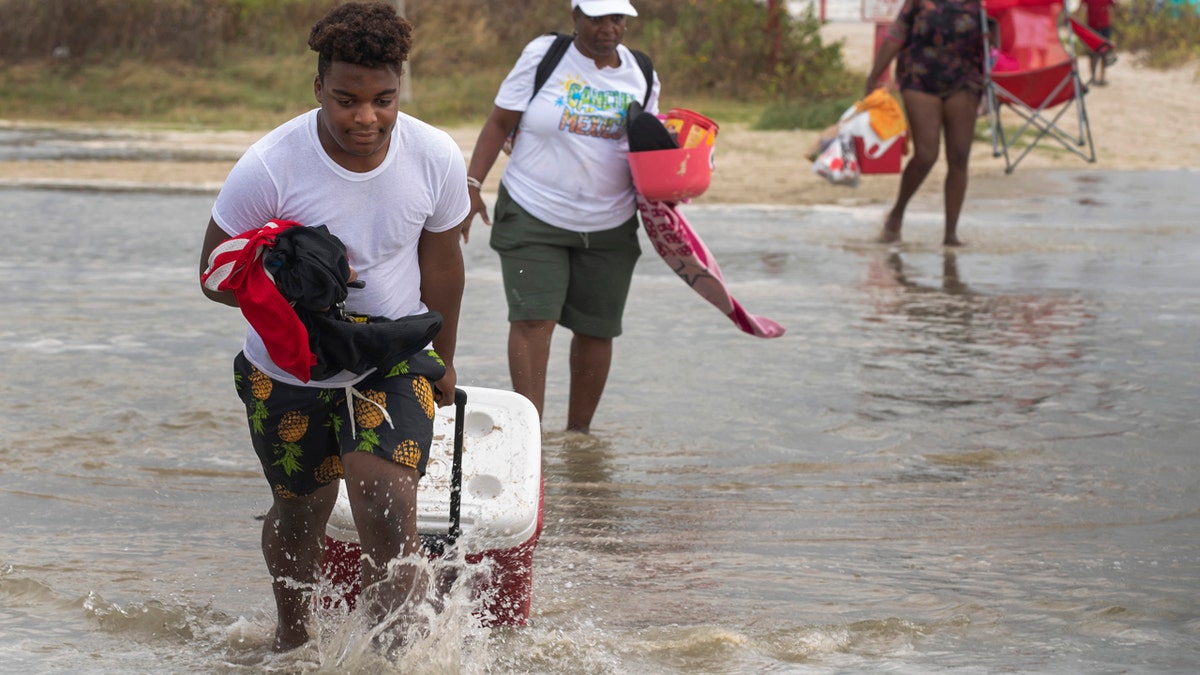Cleanup efforts are underway in Pensacola, Fla., after Hurricane Sally slams Gulf Coast
Hurricane Sally leaves severe flooding in the Gulf Coast; Charles Watson reports.
The latest tropical storm in an exceptionally busy 2020 Atlantic hurricane season is crawling off the coast of Texas, threatening to bring flash flooding to areas still impacted by Hurricane Laura.
The National Hurricane Center (NHC) said early Sunday that Tropical Storm Beta is packing maximum sustained winds of 60 mph and is located about 180 miles southeast of Galveston, Texas, moving west-northwest at 3 mph.
"It's not really moving anywhere, but it will eventually start to do so," Fox News' Chief Meteorologist Rick Reichmuth said on "Fox & Friends Weekend." "Probably make some sort of landfall. A strong tropical storm across parts of the central Texas coastline, it's going to bring a lot of rain."
BEST WAY TO PREPARE FOR A STORM SURGE
According to forecasters at the NHC, Beta is forecast to slowly move towards the Texas coast and make landfall by Monday night.

Tropical Storm Beta swirls over the Gulf of Mexico off the coast of Texas and Louisiana on Sept. 20, 2020. (NOAA/GOES-East)
A tropical storm warning is in effect from Port Aransas, Texas to Morgan City, La., with a storm surge warning posted from Port Aransas to Rockefeller Wildlife Refuge in Louisiana.
Little change in strength is forecast before Beta reaches the Texas coast, and weakening is anticipated once the storm moves inland. Earlier predictions had Beta reaching hurricane strength before making landfall.
Forecasters warn that through Thursday, Beta is expected to bring 8 to 12 inches of rainfall, with isolated amounts of 20 inches, from the middle Texas coast to southern Louisiana.
"Tropical Storm Beta is forecast to move very slowly toward the Texas coast over the next couple of days," the National Weather Sevice's Weather Prediction Center tweeted. "Heavy rain will likely lead to flash flooding from the middle Texas coast to southern Louisiana."
Beta's slow movement, including persistent winds, raised concerns about a dangerous storm surge and tide that could reach up to 4 feet in some areas.
"A lot of rain for some people," Reichmuth said on "Fox & Friends."
TROPICAL STORM BETA PREDICTED TO STRENGTHEN AND HIT GULF COAST NEXT WEEK
Coastal communities began preparing for Beta over the weekend, with the city of Galveston and Galveston County on Saturday issuing voluntary evacuation orders, along with the city of Seabrook.

Waves crash as Houston resident Tinh Pham fishes from the rocks at Diamond Beach on the west end of the Galveston Seawall in Galveston, Texas on Saturday, Sept. 19, 2020. (Stuart Villanueva/The Galveston County Daily News via AP)
Mayor Pro Tem Craig Brown said in a statement that high tides and up to 10 inches of expected rainfall would leave roads impassable, especially along the city’s west end and low-lying areas.

Stacey Young gives her daughter, Kylee Potts, a piggyback ride across the flooding Stewart Beach parking lot in Galveston, Texas on Saturday, Sept. 19, 2020. (Stuart Villanueva/The Galveston County Daily News via AP)
County Judge Mark Henry said during a Saturday news conference that his concern is also based on rising waters creating a storm surge and that a mandatory evacuation is not expected.

Houston resident Lupe Don removes his flip-flops while moving his car from the flooding Stewart Beach parking lot in Galveston, Texas on Saturday, Sept. 19, 2020. (Stuart Villanueva/The Galveston County Daily News via AP)
“If you can survive in your home for three or four days without power and electricity, which we’re not even sure that’s going to happen, you’re OK,” Henry said. “If it’s uncomfortable or you need life-support equipment, maybe go somewhere else.”
The storm system may bring more misery to Lake Charles, La., where thousands of people remain without power more than three weeks after Hurricane Laura slammed into the region.
LOUISIANA RESIDENTS FACE TOUGH ROAD TO RECOVERY WITH CORONAVIRUS RESTRICTIONS AFTER HURRICANE LAURA
Donald Jones, a NWS meteorologist based in Lake Charles, said in a Saturday briefing that Beta could bring up to 20 inches of rain in parts of the area.
“A lot of people have been saying, ‘Is this going to be like Harvey? Is this going to be like Imelda?'" Jones said. “We’re not talking about rainfall totals yet that are on the orders of magnitude that we saw with that.”

Tyler Heads totes his belongings through tidewaters as he and other beachgoers cross the flooding Stewart Beach parking lot in Galveston, Texas on Saturday, Sept. 19, 2020. (Stuart Villanueva/The Galveston County Daily News via AP)
Imelda, which struck southeast Texas in 2019, was one of the wettest cyclones on record while Harvey dumped more than 50 inches of rain on Houston in 2017. But if Beta slows down, rainfall totals could go higher than 20 inches
“Harvey was a very specific and unique event, but we are talking about the same idea in terms of very heavy, heavy rainfall," he said.
CLICK HERE FOR MORE WEATHER COVERAGE FROM FOX NEWS
Beta is one of three named storms whirling in the Atlantic basin during an exceptionally busy hurricane season. The 2020 Atlantic hurricane season has broken numerous records, as forecasters on Friday, ran out of traditional names and went to the Greek alphabet for storms Alpha and Beta.
This was only the second time in history that hurricane center forecasters have had to pull out the Greek alphabet for names, with the last time being 2005.
If the system makes landfall in Texas it would be the ninth named storm to make landfall in the continental U.S. in 2020. Colorado State hurricane researcher Phil Klotzbach said that would tie a record set in 1916.
Hurricane season starts June 1 and ends Nov. 30, but September historically produces the most Atlantic Ocean basin tropical activity.
NOAA forecasters have been calling for up to 25 named storms this season with winds of 39 mph or higher; of those, seven to 10 could become hurricanes. Among those hurricanes, three to six will be major, classified as Category 3, 4 and 5 with winds of 111 mph or higher.
That's far above an average year. Based on 1981 to 2010 data, that is 12 named storms, six hurricanes and three major hurricanes.
CLICK HERE FOR THE FOX NEWS APP
So far this year, there have been 23 named storms, including eight hurricanes and of those, two major hurricanes.
Parts of the Alabama coast and Florida Panhandle are still reeling from the effects of Hurricane Sally, which roared ashore on Wednesday.
The Associated Press contributed to this report.












































